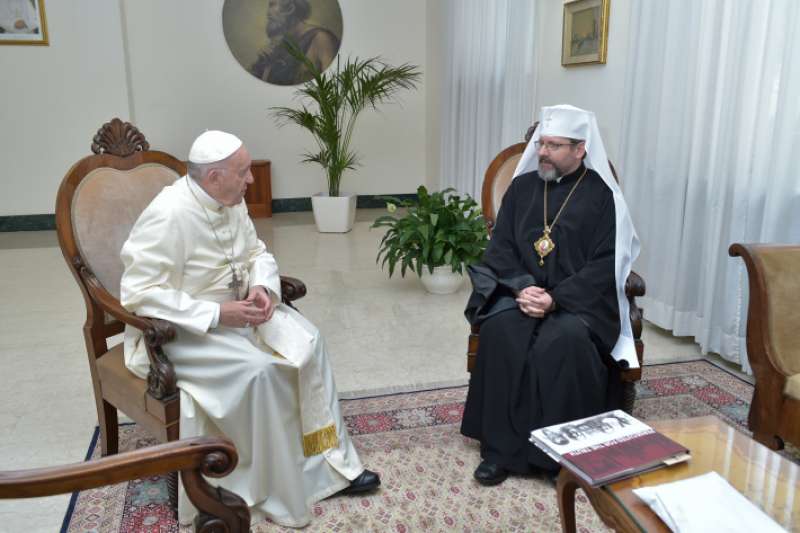According to a release from the Ukrainian Greek-Catholic Church, during a meeting with the Major Archbishop of Kyiv-Halyč on Tuesday, Pope Francis commended the Church for its witness to Christian unity.
The Pope thanked the Ukrainian Greek-Catholic Church for its martyrdom “as a confession of the Christian Faith and a testimony that the Successor of Peter the Apostle has a special mission of service to Cristian unity,” according to a statement from the Ukrainian Greek-Catholic Church.
The Vatican announced that Pope Francis met with Archbishop Sviatoslav Shevchuk July 3 at the Vatican's Santa Marta guesthouse, but did not give details of their encounter.
The meeting was requested by Archbishop Shevchuk to commemorate “the 1030th anniversary of the Baptism of Rus'-Ukraine.”
The event being celebrated was the 988 baptism of Vladimir (Volodymyr) the Great, Grand Prince of Kiev, which resulted in the Christianization of Kievan Rus', a state whose heritage Ukraine, Russia, and Belarus all claim.
Archbishop Shevchuk told Francis that the Ukrainian Greek-Catholic Church's path was a “testimony of the unity that Christ’s Church enjoyed in the First Millennium, at the time of the Baptism of Saint Volodymyr, and a particular witness of martyrs and confessors for Church unity, - in the 20th century.”
“Our Church’s path of martyrdom consists in a recognition of the particular mission of the Successors of the Apostle Peter as visible servants of the unity of Christ’s Church,” he said.
The Major Archbishop discussed the relationship of his Church to the other Churches rooted in the Christianization of Kievan Rus', including the Russian Orthodox Church and several Orthodox Churches in Ukraine.
In addition to the Ukrainian Orthodox Church (Moscow Patriarchate), there are two other Orthodox Churches which have claimed autocephaly, but are not recognized by other Orthodox Churches: the Ukrainian Orthodox Church (Kyiv Patriarchate) and the Ukrainian Autocephalous Orthodox Church.
These two latter Churches have asked the Ecumenical Patriarch of Constantinople Bartholomew for recognition as autocephalous Churches, in a request forwarded by Ukrainian president Petro Poroshenko and supported by the nation's parliament.
Archbishop Shevchuk called the division among Orthodox Churches in Ukraine a painful reality, and recounted “shameful incidents where the Holy Mysteries (Sacraments), in particular the Mystery of Holy Baptism, had been used to humiliate or deny the Christian identity of faithful belonging to certain denominations.”
He said that the Ukrainian Greek-Catholic Church looks “positively upon the efforts to overcome the divisions in Ukrainian Orthodoxy, according to the ancient principal salus animarum lex suprema est (the salvation of souls is the highest law). At the same time, we regard these processes as internal Orthodox matters and, - on no account, - do we ever interfere in them or take part in them. We believe that the civil authority must ensure that conditions exist that allow for the freedom of all churches, in our country. We also believe that is unacceptable for the state, - to treat any Church as an official state church.”
The overtures of the UOC-KP and UAOC to the Ecumenical Patriarch have been denounced by the Russian Orthodox. Vatican Insider has reported that Metropolitan Hilarion, spokesman for the Moscow Patriarchate, told the Greek Orthodox website Romfea that “blood will be shed” if the Ukrainian Churches are granted autocephaly.
Metropolitan Hilarion claimed there are “three forces” behind the push for autocephaly in Ukraine: Ukrainian political leadership, the UOC-KP itself, and the “uniates” of the Ukrainian Greek-Catholic Church, each of which acts “for its own benefit.”
During his meeting with Pope Francis, Archbishop Shevchuk touched upon this “uniatism”, saying the Ukrainian Greek-Catholic Church rejects “uniatism” as a method for achieving Church unity, since it has received the Balamand declaration.
That 1993 declaration of the Joint International Commission for Theological Dialogue Between the Catholic Church and the Orthodox Church said that seeking the conversion of persons from one Church to the other, which it said has been called “uniatism”, cannot be accepted as a model to follow or as a model for the unity sought by the Churches.
Archbishop Shevchuk stated to Pope Francis that “it is obvious that the ultimate act of uniatism, in the 20th century, was the 1946 Lviv pseudo-council.”
The 1946 Synod of Lviv was the means by which the Soviet Union acted to suppress the Ukrainian Greek-Catholic Church and forcibly to absorb it into the Russian Orthodox Church.
“Accusations of uniatism directed at the UGCC, due of its active ecumenical position and its invitation to seek paths of unity with the Orthodox, are nothing less than a manipulation of the facts. The Eastern Catholic Churches, in and of themselves, are not 'some sort of method,' but are living members of Christ’s Church, which not only have the right to exist but are also called to engage in mission and in the work of evangelization.”
The release from the Ukrainian Greek-Catholic Church said Pope Francis assured the Church of his support and agreed that accusations of uniatism against it are groundless.
“He also thanked the UGCC for its active participation in rebuilding Ukrainian society based on the principles of Catholic Social teaching … He thanked the Church for its promotion of authentic Christian patriotism which, under no circumstances, should be used or manipulated for particular ecclesiastical or ideological goals,” according to the statement.
“The Holy Father also expressed his closeness to the Ukrainian nation which, as the victim of unjust aggression, is living through a painful period of its history.”
The statement added that Francis drew attention to the importance of Polish-Ukrainian reconciliation, and said he would also remember Ukraine during his July 7 ecumenical prayer for peace in the Middle East which will be held in Bari.

